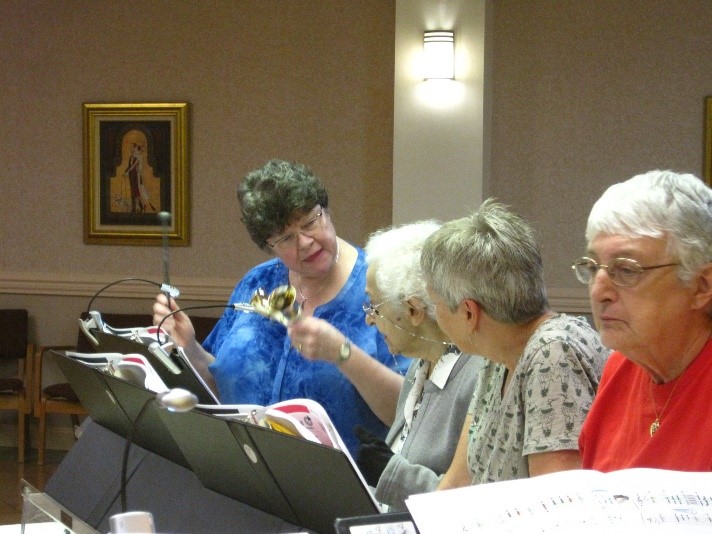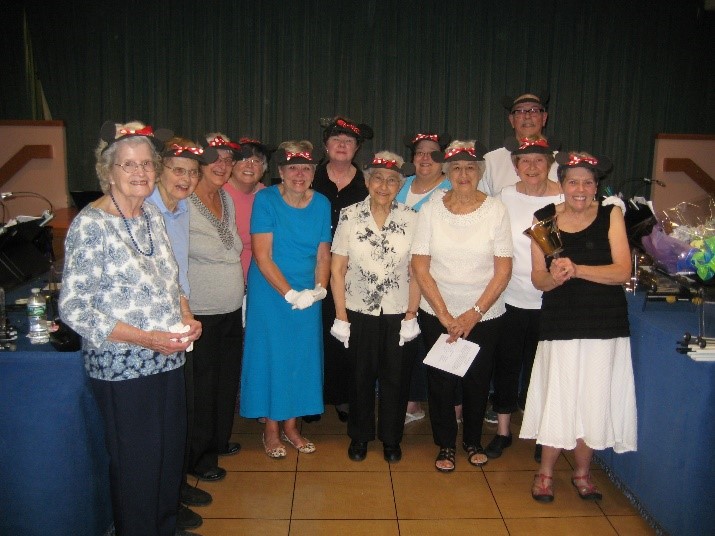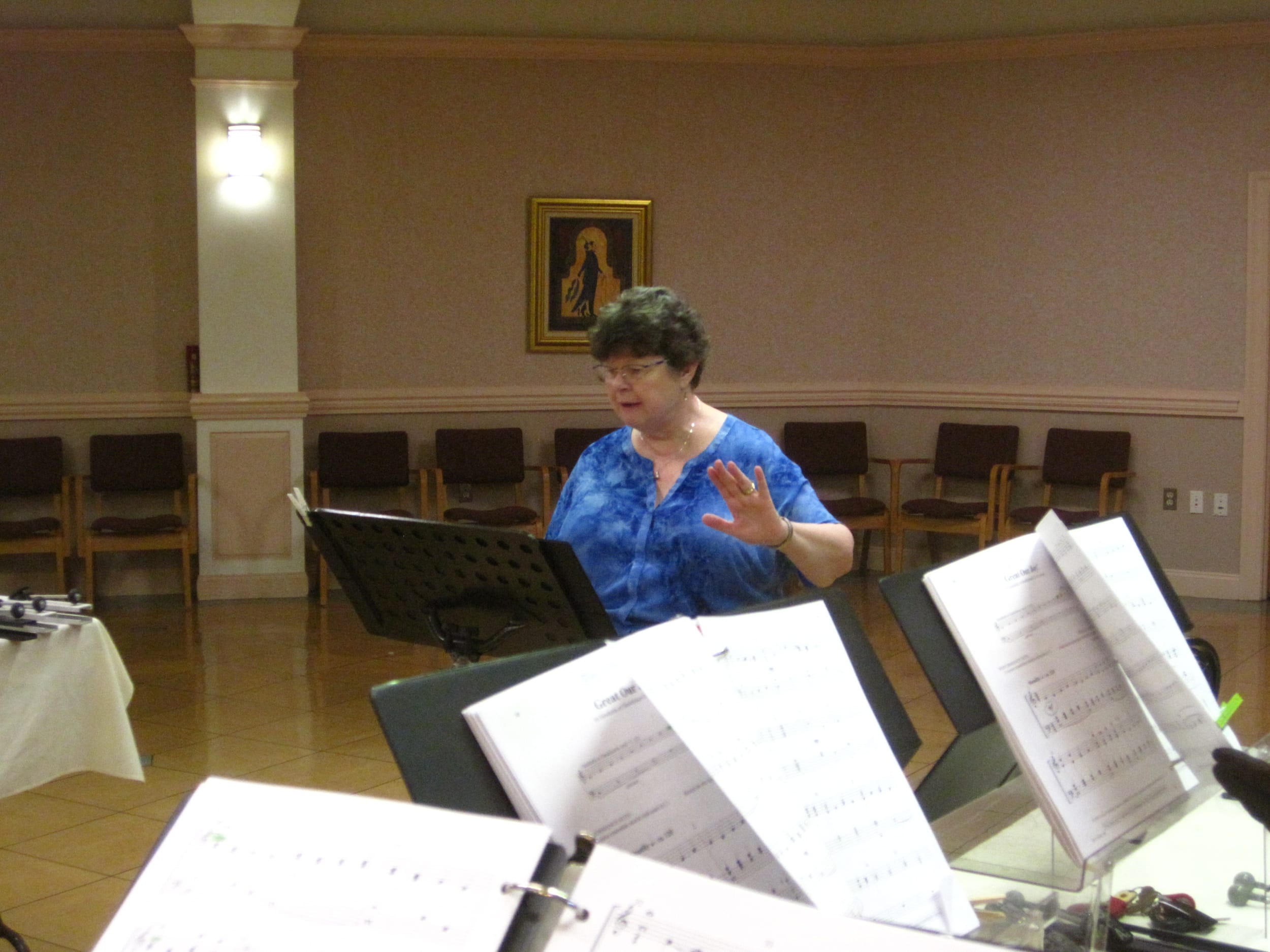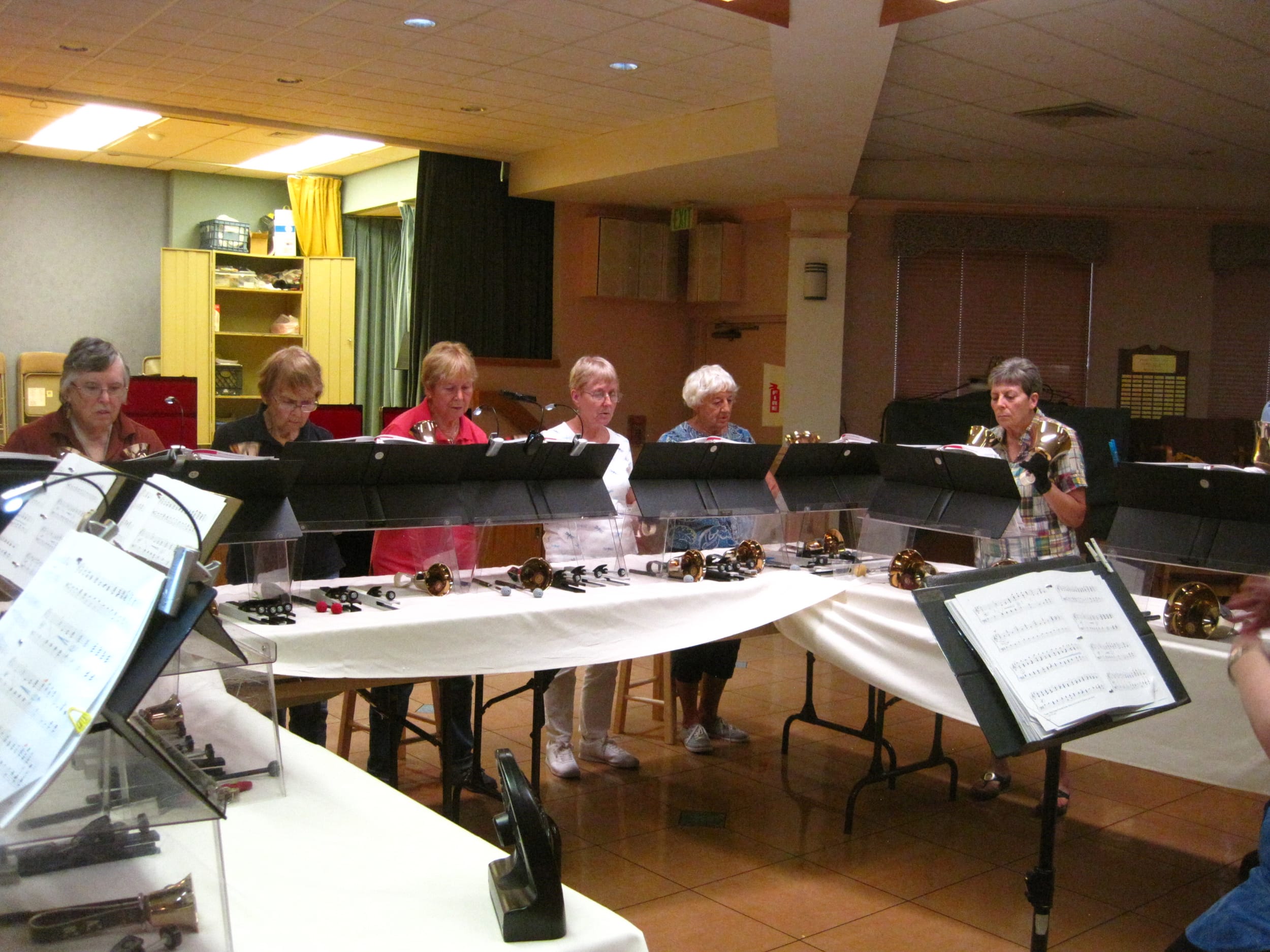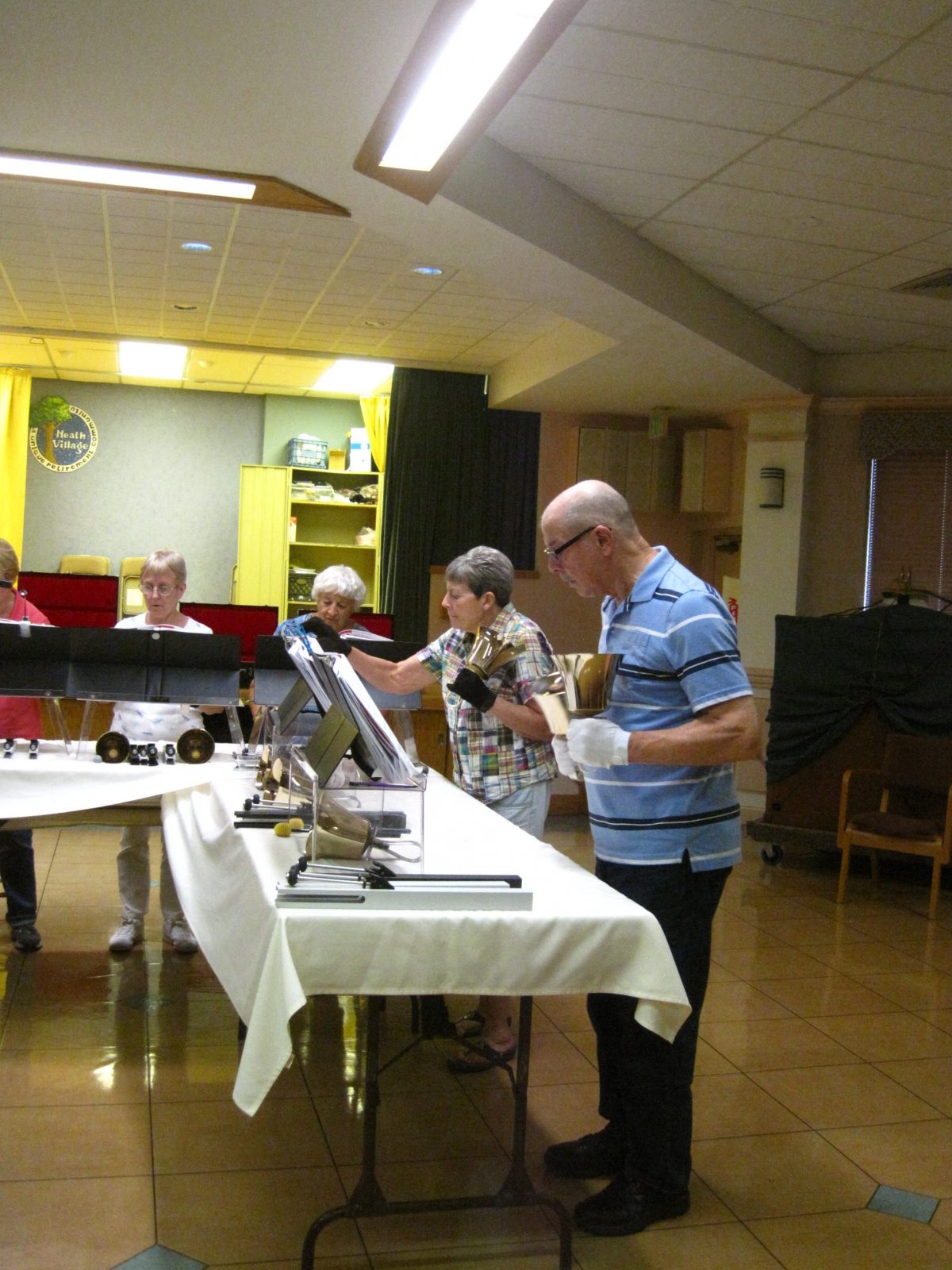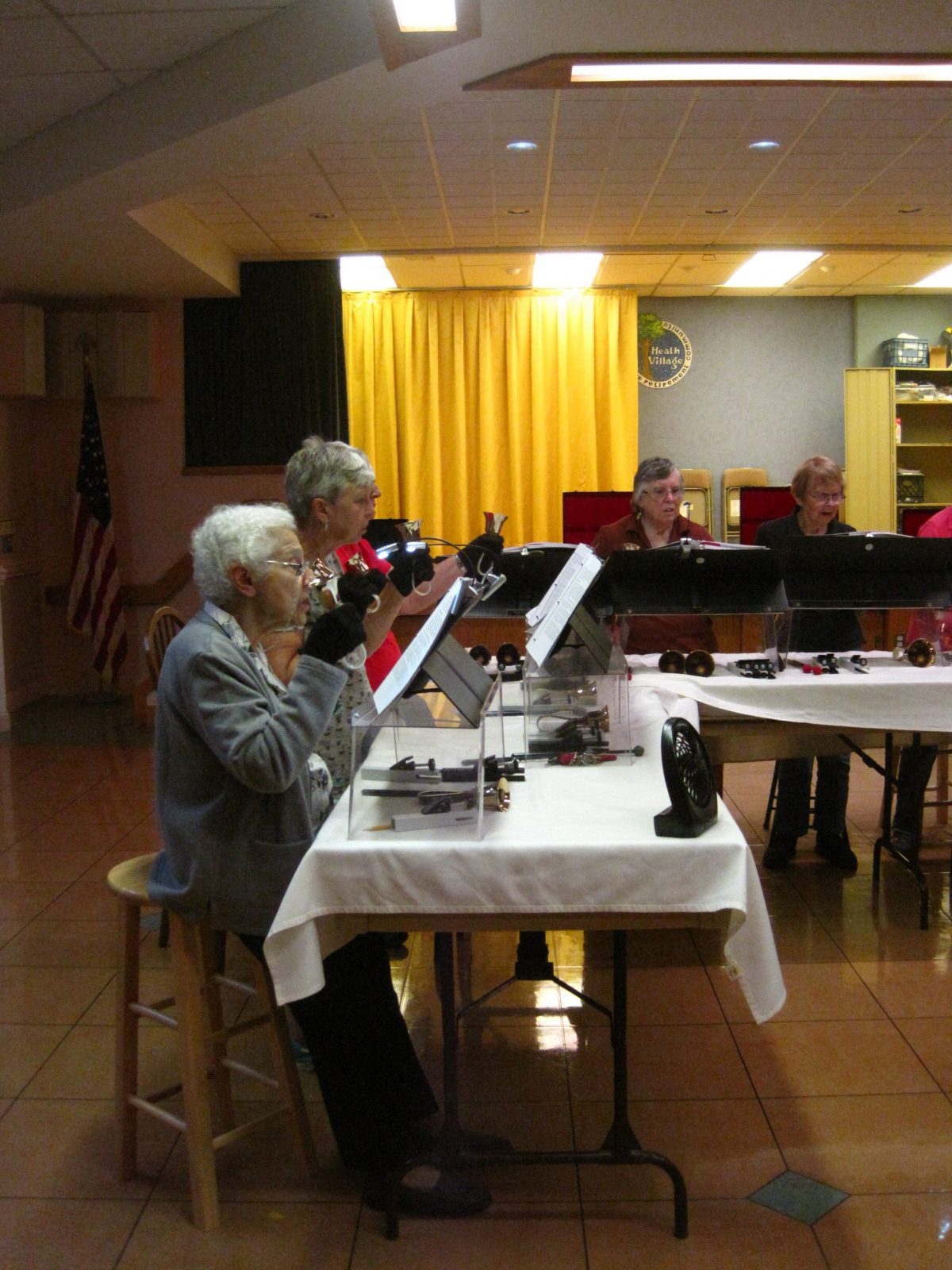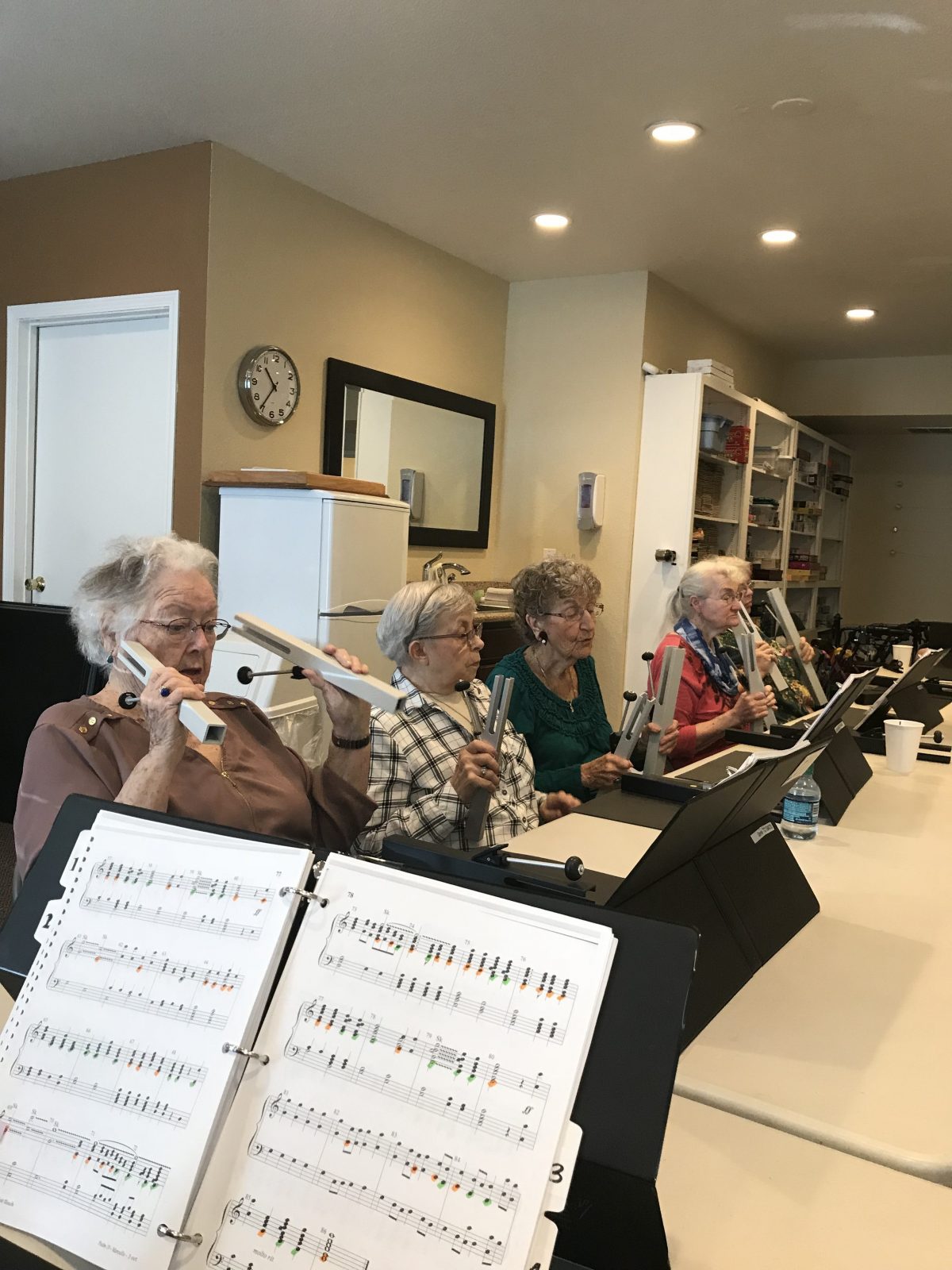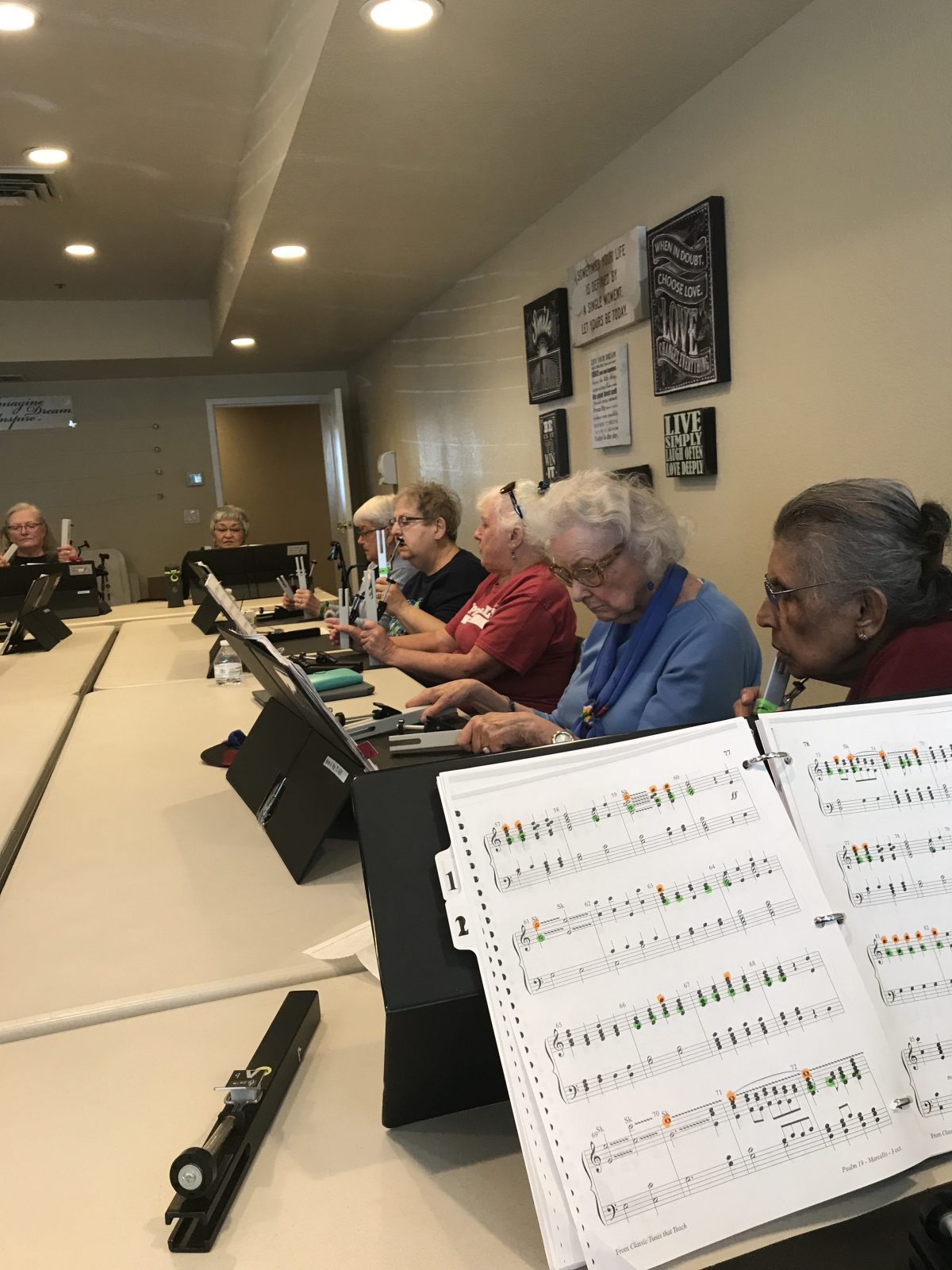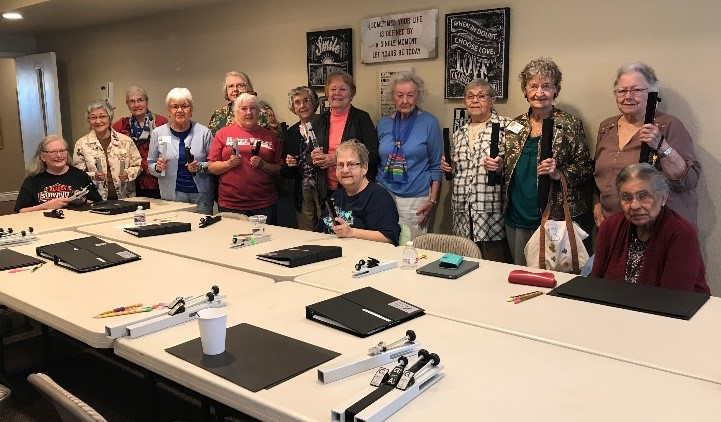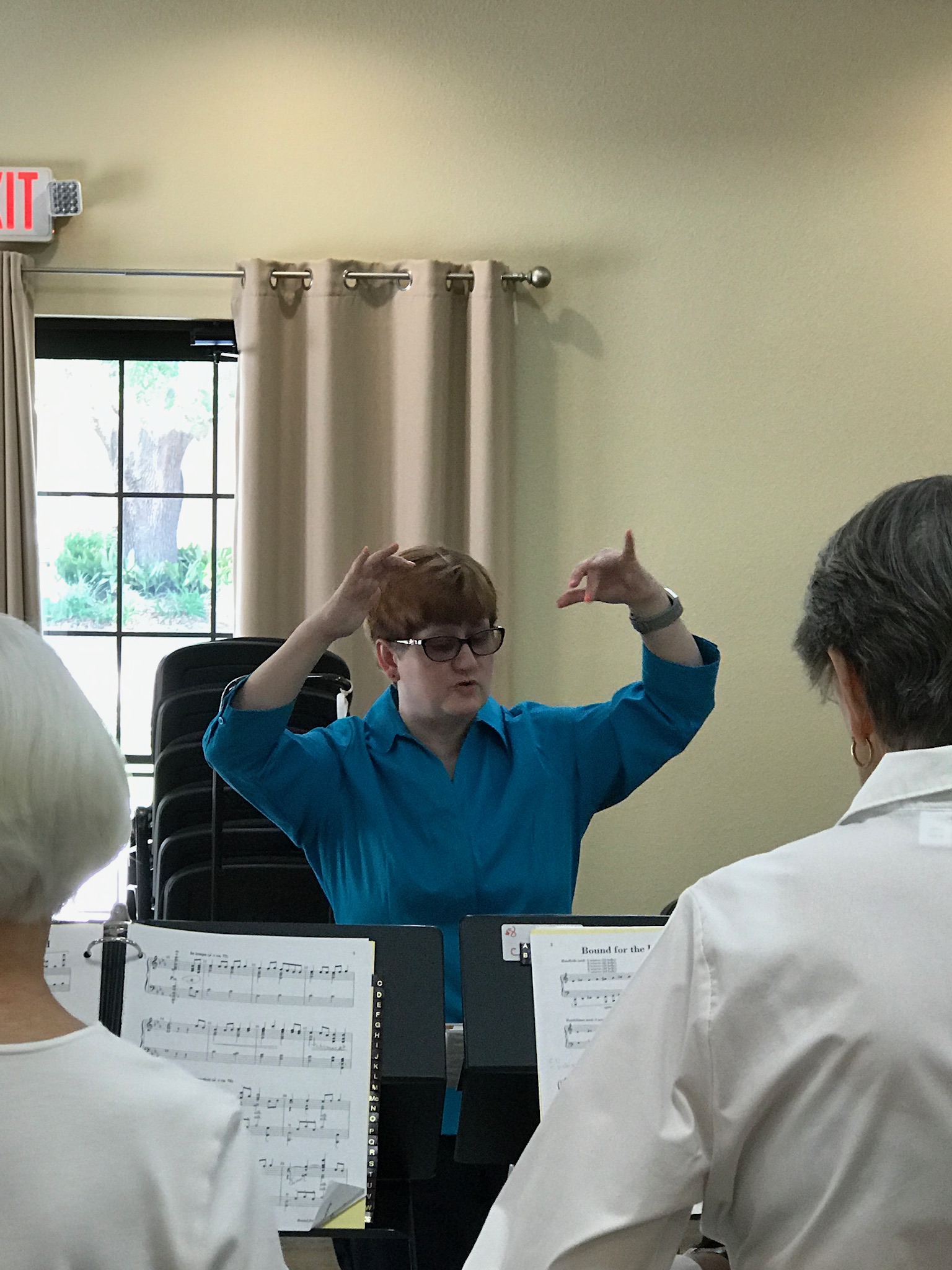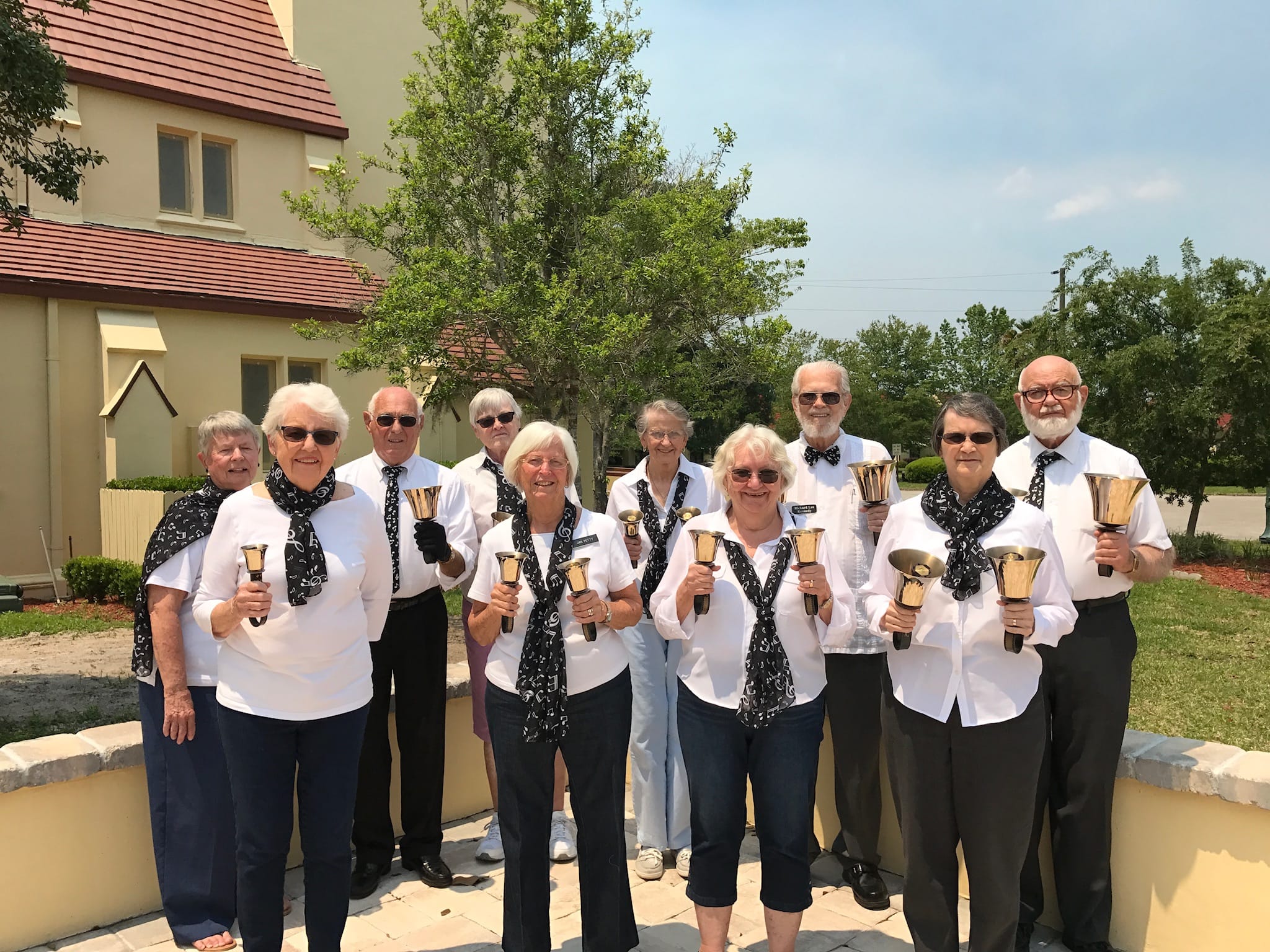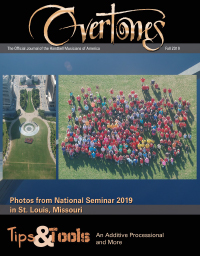Are you curious about handbell programs in senior communities? Read on to learn about four different groups and how each has created a meaningful music community for their residents and community using handbells or handchimes.
Coordinated by Mya Dundzila
Let’s meet our guests:
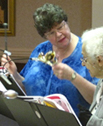
Janice Hunold in Hackettstown, New Jersey, directs the Heath Village Bell Choir.

Ellie Hodder in Portland, Oregon, directs multiple bell choirs in senior centers in the Portland area.

Erin Moore in Iowa City, Iowa, is the Activity Coordinator at Emerson Point Assisted Living.

Jennifer Goodwin in Penney Farms, Florida, directs the handbell choir at Penney Farms Retirement Community.
Click the photos below to see more of each of our participating groups:
Heath Village Bell Choir
Hackettstown, New Jersey
Town Center Village Ringers
Portland, Oregon
Penney Chancel Bells
How would you describe your choir?
Janice: The Bells of Heath is an eleven-member community bell/chime choir with members ranging in age from early 70s to mid-90s. Eight ringers are residents of Heath Village, a senior-citizen complex in Hackettstown, and three are “community” ringers from the town. Most of the ringers have musical training, but two had never read music at all until they joined the choir. We are a dedicated group and we have FUN!! In our weekly rehearsals (September-June), we rehearse, share stories, and laugh a lot at ourselves. It’s a relaxed group, and we aren’t trying to win any awards, but we sure enjoy our time together. They appreciate the time spent together, the connection with a beautiful instrument, and the opportunity to be physically and mentally active. So, I would describe them as young at heart and spirit even though some use walkers!
Ellie: I have three senior handchime choirs. Each is at an independent living senior community where residents must be at least 62 years old. The communities offer a range of activities, trips, cultural activities, etc. My three ensembles are typically over age 75, and my oldest musician just turned 99 in December.
Erin: Our group isn’t structured like a church chime group. Because I am never sure who or how many will be able to come, and many do not read music or have poor vision, we do not play traditional bell arrangements. Instead, I divide them into groups based on chords. I lead familiar songs and we sing along while playing. I point to each group when it is time to play, and it ends up forming a chordal accompaniment to our singing. It works mostly because I have a music theory degree and music therapy certification, so I’m pretty good at keeping the chords straight and pointing to the right group at the right time. (And they enjoy laughing at me when I do make mistakes!) The tenants really enjoy the sound and the satisfaction of creating something beautiful. I get wonderful feedback from them on this group.
Jennifer: A group of dedicated, very talented individuals.
How long have you been directing this choir?
Janice: This is my fourth year.
Ellie: The longest existing group is about 15 years old. I took that one and another group over 5 years ago and started the third group that year.
Erin: I started leading chimes at this facility about five years ago, when I was still a church bell choir director, not an Activity Coordinator, and was taking music therapy classes. This is actually how I ended up knowing about and applying for the activity coordinator job a couple of years later. The tenants at the facility had been playing with the little colored kids bells and just playing melodies before I started. I changed to the chord method, because I felt the finished product was much more satisfying, and it allows for more variety in number and ability of ringers.
Jennifer: I am just finishing my fourth year. I started directing them after the previous director retired.
What do you enjoy most about directing them?
Janice: Two things – working with my ringers, who are very special people, and being around bells. I used to ring in a church and substituted with this group, but now I only direct this group and am not playing. So being around bells is a joy because I really enjoy them. And I really enjoy working with seniors. Their perspective on life is a lesson learned well. They tend to appreciate the little things in life, which is something we should all do more.
Ellie: Just about everything! They are engaged, they want to learn and they want to be excellent. We laugh a lot. If ever there were a stereotype buster for aging, this is it!
Erin: The pleasure and satisfaction the tenants get from making beautiful music. Some tenants tell me they never learned to play a musical instrument earlier in life, so it is especially meaningful for them to have the opportunity to participate in an instrumental group now—it’s never too late!
Jennifer: Hearing the wonderful music they create.
Any special accommodations during rehearsals or concerts?
Janice: We have a stool or chair available for everyone. Sometimes they need to sit. We also have lots of lighting. The overhead lighting in our rehearsal space isn’t enough for a few of the ringers and they have individual lights at their stands. Only two people prefer the stand lights.
Ellie: Armless chairs. I mark music for anyone who asks (all of the beginning group and 1/3 to 1/2 of the other two).
Erin: I try to give smaller chimes to tenants with weaker wrists or arthritis. If I have to leave a note out of the chord, it is always the fifth. I try to make sure at least two ringers have the root and third of every chord. Ringers who enjoy more challenge sometimes get two chimes (both in the same chord). Also, if we have fewer ringers show up we ring 3-chord songs, while if we have more we might try 5 or 6 chord songs! I pick songs out of a guitar chord songbook, so I choose based on how many people are there on a given day and what songs they like. Sometimes I do a quick mental transposition to keep from having to redistribute chimes between songs!
Jennifer: We have stools for those members who have difficulty standing.
Do you have an assistant? If so, how does she/he help during rehearsals?
Janice: I don’t have a formal assistant, but one of my ringers is what I call the “president” of the bell choir. She lives at Heath Village and she recruits when new people move in, she keeps track of the ringers and lets me know if they’re sick or away. Most ringers tell me directly (email) if they’ll be absent, but sometimes they have a medical or family situation at the last minute and let our “president” fill me in if they’re absent. She also coaches the ringers who are on either side of her when they get lost. It seems she’s well-positioned because those two ringers need help from time to time and she’s very capable and able to help them find their way. Sometimes she’ll meet with ringers and they’ll practice at home with spatulas or wooden spoons!!
Ellie: No.
Erin: I don’t have an official assistant with the group, but now that I am the Activity Coordinator, I do have some college student volunteers that help with various activities. When one of them is able to come it really helps, especially with tenants who do not see well and need someone next to them for cues.
Jennifer: No, I don’t have an assistant.
What is your biggest challenge?
Janice: Finding good music, and the reasons are two-fold.
My ringers are Level One or Level One Plus at most. Let’s break this down. Some of my ringers could probably do Level Two. But some of my ringers are playing music for the first time in their lives. They had to learn to read music, count, learn bell notations, bell movements, so on. I find it remarkable that they could learn something so complex late in life. But they simply can’t do eighth notes. So, I need simple music.
The second challenge is to find good music at Level One that is popular and not sacred. We are not a church group. We are a community group. There just isn’t anybody composing popular music (American standards, Broadway show tunes, even pop music) at Level One. Sandra Eithun has a couple of books out that work well, but it’s still pretty traditional music. I would LOVE for somebody to arrange great music for Level One that isn’t sacred.
Ellie: Keeping them in music! Since these are not faith communities, I need a large supply of secular music. (I ask permission to use holiday music in the fall and everyone is accommodating as long as that’s not all we do.) They get tired of classics–most of the reproducible repertoire–and I don’t have time to do enough arranging to keep up.
Jennifer: Finding music that is not too challenging but at the same time not too easy either. (We usually ring L2-L3.) The music needs to be interesting enough so that the members on the ends have something to do instead of standing around for 20+ measures and only play a couple of notes…
What is a typical concert like?
Janice: We perform twice a year. We play 12-14 pieces per concert. Our winter concert (December) is holiday music. Every winter concert has Silent Night. It’s the best song on bells, right? We play appropriate music for the season. Our spring concert is in June. We play music that isn’t tied to a theme. I did have access to some Disney music last year and we played the few pieces in the book that we could. The counting wasn’t difficult, but the bell changes were challenging. We got through it and we wore Mickey Mouse hats for fun!
I welcome the crowd (usually around 90-100 people in the auditorium) and I read program notes that I hope will interest the crowd between numbers. This gives my ringers the opportunity to pick up the correct bells or chimes for the next piece. I enjoy writing the program notes and researching the pieces and I try to find something interesting that the crowd may not know about the piece or composer.
They’re pretty straightforward concerts. We just hope everybody is still awake at the end!
Ellie: We sometimes offer a concert in each community. These are usually short and involve some kind of audience participation. The goal is to share what we do each week. I dislike “dog and pony shows” at any venue and try to make it fun and inclusive. Even seniors get nervous!
Erin: We really ring more as an activity than for concerts. We have played a couple of songs as part of seasonal parties at the facility, but we don’t have set “parts” or much repetitive rehearsing. With the point and play method, they can ring different chimes and different songs without drastically changing what they are doing. This is definitely different than traditional bell choirs I have directed in churches. It is more designed for immediate success at a variety of ability levels and with constantly changing ringers. The tenants feel good producing a nice sounding accompaniment to their singing without having to learn music notation or stress about a certain “part”.
Jennifer: We usually ring during church services about 4 times a year. We will occasionally combine with the Sanctuary choir for a joint concert.
How do you recruit your ringers?
Janice: We’re at capacity right now, so we don’t need to recruit quite as much as we used to. But we are always looking for people with experience and as I said before, I have the “president” who checks out new arrivals. Also, people in the audience at the concerts really enjoy the bells and want to join us. Word gets out that we have fun and people check us out to see if they can play. Right now, we don’t have the capability to train absolute newbies, so we have experienced ringers right now who join us as subs. In years past, when we had a dedicated rehearsal room, I could go in and train new people, but we lost our room. So, it’s very difficult to teach someone. But we have enough experienced musicians at the village who help.
Ellie: Word of mouth and flyers. Each facility has a person who helps with class registrations and that person is usually helpful.
Erin: Since I am the Activity Coordinator at the facility, I simply recruit by listing Chimes on the Activity Calendar and also inviting tenants who I know might be interested.
Jennifer: They usually find me. This is a small, very talented Christian community. When someone moves in and if they have rung bells we usually know pretty quick. My ringers are so dedicated that they will call a sub whenever they cannot be at rehearsal or a service. It is rare that I will have an open spot during rehearsal.
How did you acquire your bells/chimes?
Janice: A wonderful retired music teacher named Marie Springstead bought a set of bells and chimes for Heath Village almost twenty years ago while she was living there. She was the first director and directed for many years.
Ellie: I used the Oregon Area 10 chime loan program the first year and then purchased my own. The facilities do not own anything related to the class so it’s up to me to figure out how to make that happen.
Erin: I talked to a church that I knew had a 2-octave set of Suzuki chimes that they didn’t use much. (They had a full set of Malmark ones that they used regularly). I asked if we could use them, and if the church needed them for an event, I would be happy to transport them back and forth. I eventually ended up also getting another set of Suzuki chimes that someone had given my mom. They are not in as good shape as the ones I borrow, but I supplement with them so that more people can ring and we can fill out the chords more. The chimes are much more age-appropriate and musically satisfying for older adults than the little colored bells, and the sound is not so hard on their ears.
Jennifer: It is my understanding that the music ministry did fund-raising. We have 3 octaves of Schulmerich Handbells and Handchimes.
How does your facility support your choir?
Janice: The village facilities crew sets up our tables and pads and puts out the stools and chairs. They take our bell cases out of the storage area for us. We put the tablecloths on and set up the bells, chimes and stands etc. and put things away after rehearsal. The crew then takes the tables down. I am paid a small stipend through the activities department as this is considered an activity. I am reimbursed for any music I buy, but I haven’t spent a lot because good music is so difficult to find!
The concerts are part of the usual “Wednesday night entertainment” that occurs. This Wednesday night program is usually a musical performance from a resident or from an outside group from the community and attracts a big crowd. We’re part of that and people look forward to our twice-yearly concerts. So, we have support from the staff and from the residents.
This summer, I’ll be taking the bells and chimes to Malmark for a tune-up and the village is paying for that.
Ellie: They provide space and collect class fees.
Jennifer: We are very well supported by the church’s music ministry. We have our own rehearsal space and closet to store our equipment in.

